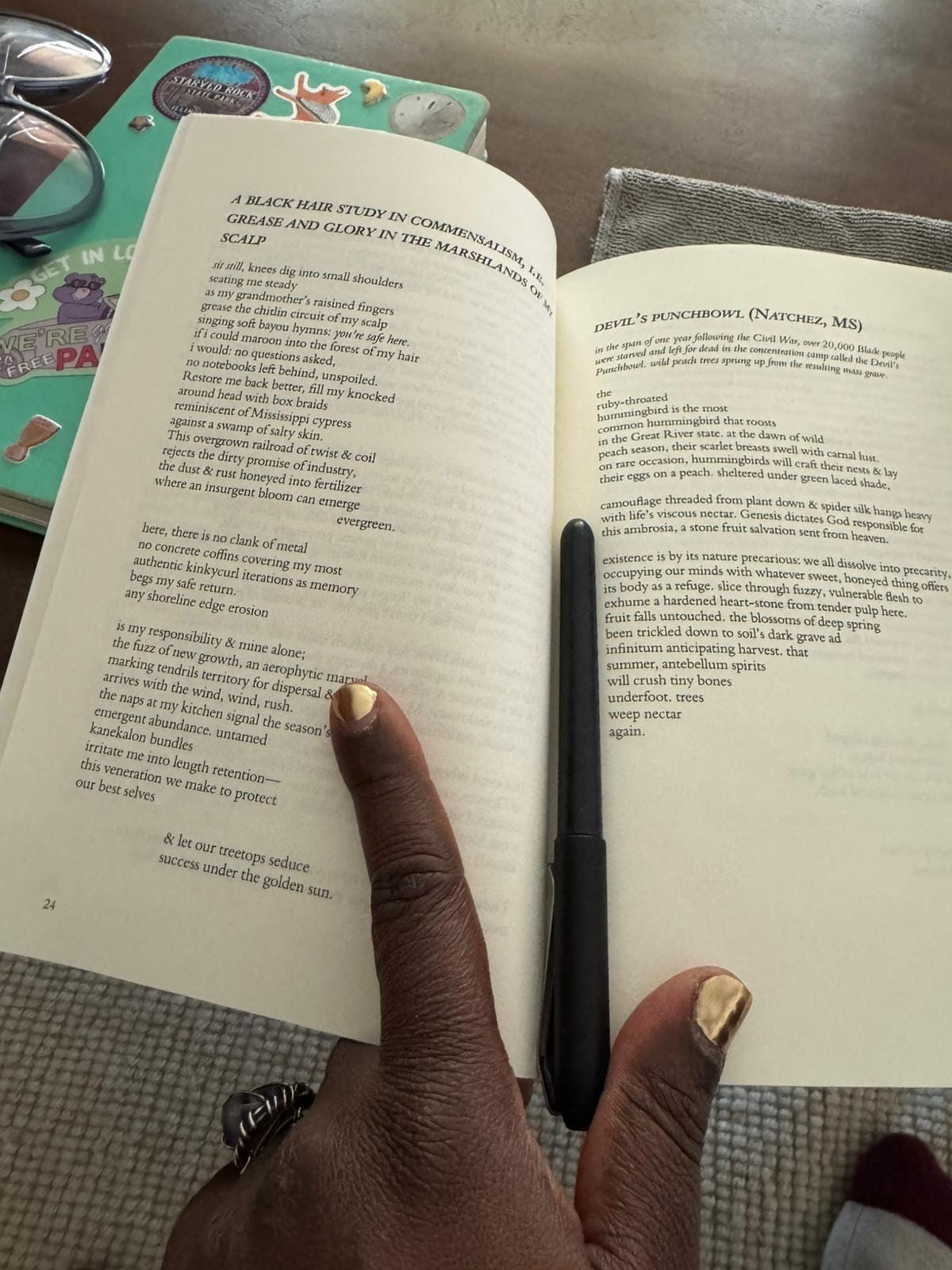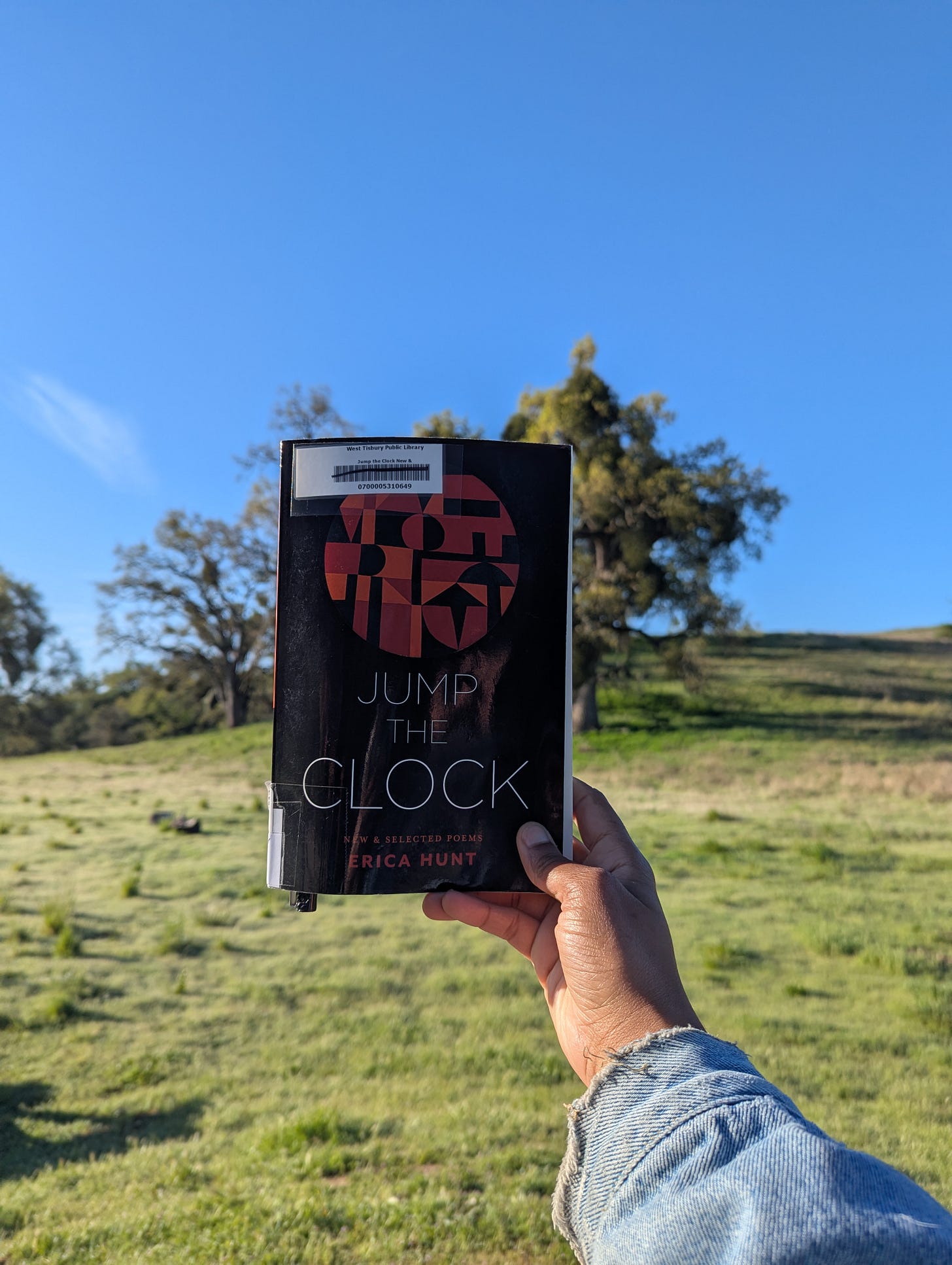"stillborns slither/in the weeds of my namesake" - conjure woman after apocalypse "riddle me this: how can i be well when my lawn is forever burning?" - Life Cycle Heirloom, Ashia Ajani
Bioindicator (noun): an organism whose status in an ecosystem is analyzed as an indication of the ecosystem's health.
Bioaccumulation (noun): the gradual accumulation of substances, such as pesticides or other chemicals, in an organism.
National Poetry Month, National Earth Month – today my eco-justice poetic work Heirloom turns 2 years old. I officially have a toddler. And like a toddler, the book is starting to talk back to me, babbling its in between baby and regular speak, testing out its newfound sense of balance. In this way, my book asserts its own independence, and I can only marvel at the many journeys it has taken since its inception.
Each “holiday” is an opportunity to sell you something. During National Earth Month, the campaigns feel even more egregious. Since I spend a significant amount of my evening on Instagram Reels (please suggest other soothing things for me to do), my algorithm is fine tuned to my tastes. Because I have been doing so much research on diasporic African medicinal traditions and transplanted organisms, I get a lot of herbalist content on my feed. And I love that the girlies, some of whom have studied since childhood and others who, like myself, came into this practice as a young adult, are critically thinking about what kinds of emotional, medicinal and spiritual support we can get from reclaiming our ancestral practices.
Hibiscus is an excellent source of Vitamin C. Mullein clears the lungs. Yarrow, made into a paste, can seal cuts and scrapes with amazing speed. Calendula soothes while cayenne ignites. There is medicine all around us, and for that I’m grateful to turn to my plant kin and the memories that they can evoke past an ocean rendered portal.
But of course, there’s always a thin line between reclaiming medicine and outright fallacy. It’s Dr. Sebi 2.0 in some parts. We, particularly those of us who are in the belly of the beast, live in the afterlives of settler ecologies, a term which contextualizes ecological degradation brought about by colonial expansion. Grandma’s arthritis isn’t brought on by bad spirits, but by years of factory work. Your cousin’s asthma? Likely worsened if not caused by the highway that is right next to his bedroom window. Don’t even get me started on the various cancers, chronic illnesses and injuries caused by toxic chemicals, racist infrastructure and decimation of Black medical pathways. Wormwood can’t kill that. Teetering the line between fantasy and frugality, I’m uninterested in a herbalism that does not contend with the polluted environments we live in. I mourn the impacts of colonialism on our health, but also on our plant kin, who similarly have been poisoned by a ravenous imperial power whose only motivation for keeping its subjects alive is to have more workers.
The sun that you are standing under is not the same as the sun your ancestors stood under. The ecologies you live in are not the ecologies your ancestors lived in. The waters, some stagnant, some polluted, some overabundant in areas they too are arrivants in, have seen ruptures the magnitudes of which we are just now understanding. The soils, deprived of nutrients from the exploitation of enslaved African labor, are not the same soils your ancestors worked. A lot of your ancestors, while tethered to certain plant kin spiritually and culturally, still used these plants out of systemic neglect. In the true spirit of Sankofa, how are we harnessing this ancestral memory while also appreciating that we need to build new technologies, new epistemologies grounded in traditional techniques in order to survive this moment.
I’m not saying things are beyond repair. In fact, we all live in very different environments, different ecologies, which is why place-based knowledge is so necessary for discernment. The dichotomy of empire requires us to “pick a side,” so to speak, but I’m more interested in living in between the muck, the sludge, the gray matter that challenges our creativity. This is where the fun stuff can happen.
We live amidst several disorienting truths: one, that plants are moving, changing our relation to place, regionality and medicine making, and two, that our ancestral practices have been. So many of us, rapt in nostalgia, frozen by the horrors of the present and the uncertainty of the future, are refusing the task ahead of us that requires a new paradigm shift towards “health,” both for our community members and for our planet.
This is why the category of fugitive, emergent knowledge is so powerful to me: an experiential, experimental practice that learns how to live amongst landscapes in flux. As beautiful as they are, I don’t collect lavender close to major streets. The invasive English Ivy that scales hills along the 580 is a painful reminder of plants that stagnate, devoid of use if only for a pitiful absorber of air pollutants, many of which saturate the sky quicker than the plant can clean it. I am reminded of the tenets of Earthseed: “All that you touch
You Change.
All that you Change
Changes you.
The only lasting truth
is Change.
God is Change.”
These past five years of pandemic, genocide and televised fascism has changed me. I hope you recognize the ways in which it has changed you too. Of course, I’m still going to make my ginger reishi tea. I take my kudzu antivirals and rub camphor on my joints after a morning on my balcony garden. But I commit to this ritual with the knowledge that without the dismantling of these harmful infrastructures, they might just be a band-aid on a severely wounded world.
I hope Heirloom reminds you too of what it means to live on the borderlands of another’s paradise.
Personal announcements:
The next week and a half is gonna be a doozy! Come see me at any (and all) of these local events:
Liberation Ecology Field Course is having our graduation this Saturday! Come see me and my groupmates gab about soil remediation and food sovereignty.
TALENT: The Power of Us: Storytelling as a Climate Solution, Apr 22, 2025 6- 8:30pm
Exhale Collective Speakeasy Artist Showcase, April 25th 7-9:30 pm
“How to Write about the Land When the Land has Been Taken from Us” at the Dr. Huey P Newton Museum, April 27th 1-3 pm
What I’m reading:
Jump the Clock by Erica Hunt








this newsletter is always a timely balm and medicine.